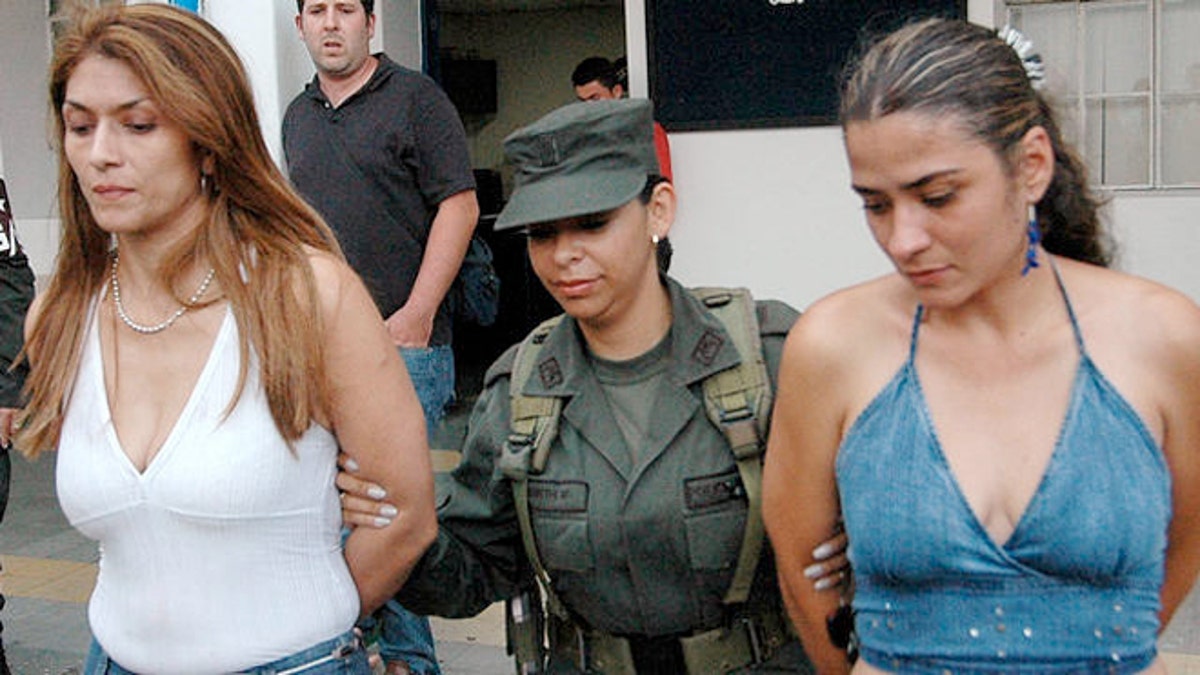
A police officer escorts two women arrested for shooting Colombian soccer coach Luis Fernando Montoya at a police station in Medellin, 185 miles northwest of Bogota, Wednesday, Dec. 22, 2004. Montoya, who led Once Caldas to South America's club championship, was shot during an attempted robbery of his wife after she withdrew a large sum of cash from an ATM machine, said Gen. Alberto Ruiz, operations chief for the National Police. Police arrested four suspects and recovered the gun believed to have been used in the attack, Ruiz said. (AP Photo/Luis Benavides) ((AP Photo/Luis Benavides))
Colombia’s drug trade used to be strictly a boy’s club with the likes of Pablo Escobar and his friends making millions hauling cocaine from the South American nation to the United States.
Now, however, drug trafficking in Colombia seems to have undergone its own women’s liberation movement.
One of the rising figures in Medellín’s drug organization, the Oficina de Envigado, is a woman known simply as “Helenita,” according to the Colombian weekly Semana.
The shadowy female figure has little control of the organizations armed wing, but has worked intensely on the group’s financial accounts such as managing land and business holdings. Like many drug trafficking organizations, the Oficina used properties such as night clubs, bars, beauty salons and private properties to launder money earned through the drug trade and extortion.
“While Semana’s leading angle is perhaps misleading in asserting that Helenita is now “at the top” of the Oficina’s hierarchy, the report is helpful in illuminating just how much of the Oficina’s activities have little to do with their most infamous operations: the trafficking of drugs,” wrote Elyssa Pachico of Insight Crime.
Helenita, who also had close ties with Gustavo Upegui, the president of Envigado soccer club and one of the kingpins of the organization, first drew the interest of Colombian authorities in 2004 when she was listed as the manager of a banquet hall linked to the Oficina’s original leader, Diego Murillo, alias “Don Berna.”
Murillo’s paramilitary was at the time participating in the governments demobilization effort but he continued to run his criminal organization from behind bars.
Helenita allegedly worked as an official administrator for Corporacion Democracia, an NGO that provided support to demobilized paramilitaries and was the voice for political interests of the so-called autodefensas. The NGO also laundered money for the Oficina.
She is one of the few members of the Oficina who is still remains at large and active within the organization. As the organization fractured, Helenita kept a low profile and handled many of the Oficina’s more legitimate functions.
Helenita also allegedly handled much of the organization’s political agenda during the 2011 local elections, by corrupting the vote and choosing who should run for certain city functions.
“Helenita's ascension in the Oficina de Envigado is also an indication of just how much the organization has transformed in recent years,” Pachico wrote. “As the Semana report highlights, with Helenita now thought to control another faction of the Oficina, it's clear there is no longer a single criminal group that exerts hegemony over Medellín's underworld.”
The once male-dominated drug trade has become more integrated in recent years, not only in Colombia but also in other Latin American nations such as Mexico.
In Mexico, many women grew up around the drug trade and learned the ins-and-outs of the business from a young age. Women in the poppy and marijuana producing region of Sinaloa started out extracting juices from the plants before moving on to transporting drugs, laundering money and engaging in talks with other traffickers.
"They absorbed it from the time they were girls. They know what it is and how it works," said Arturo Santamaria, a researcher at the Autonomous University of the State of Sinaloa, according to AFP. "Later, they started getting involved in operations.”
Colombia’s Helenita is the first female to garner headlines in Colombia as a high-ranking drug cartel member and it is not clear if this is a trend in Colombia, but she appears to have the attention of the country.
“It is less clear whether Colombia is seeing a similar trend, but doubtlessly Helenita will continue to be held up in the media as an example of the powerful roles that women play in organized crime,” Pachico wrote.
Follow us on twitter.com/foxnewslatino
Like us at facebook.com/foxnewslatino
